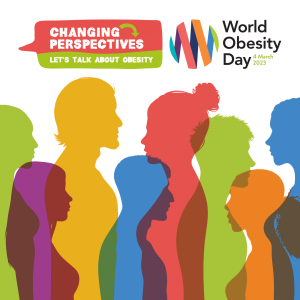 About WOD
About WOD
World Obesity Day is a unified day of action that calls for a cohesive, cross-sector response to the obesity crisis. It takes place on 4 March and is convened by the World Obesity Federation in collaboration with its global members.
Hundreds of individuals, organisations and alliances contribute to World Obesity Day every year, engaging hundreds of thousands of people across the world.
Previous World Obesity Days have encouraged people to recognise the root causes of obesity, increase knowledge of the disease, tackle weight stigma, foreground the voices of people with lived experience and act to improve the  world’s understanding, prevention and treatment of obesity.
world’s understanding, prevention and treatment of obesity.
This year’s campaign theme is ‘Changing Perspectives: Let’s Talk About Obesity’. We want to harness the power of conversation and stories so that together we can correct misconceptions surrounding obesity and take effective, collective action. Because when we all talk, debate and share, we can shift norms and transform health outcomes for everybody.
You can find out more about World Obesity Day and read about previous campaigns on the World Obesity website.
